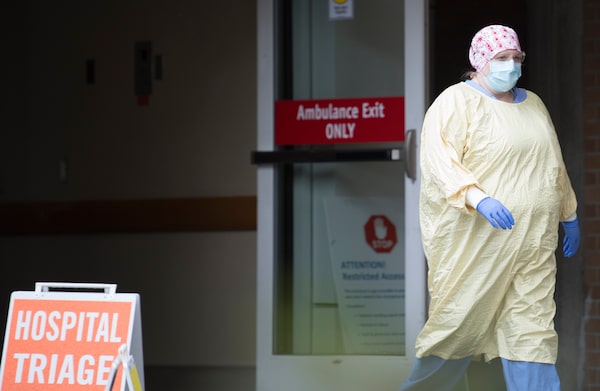
A health care worker is seen outside the Lions Gate Hospital in North Vancouver, B.C. March 31, 2020.JONATHAN HAYWARD/The Canadian Press
British Columbia’s workplace safety watchdog has received claims from 237 people alleging they contracted COVID-19 on the job, with more than half coming from the health care sector.
Of these claims, 43 have been verified, and another 163 are pending, according to data from WorkSafeBC that cover cases up to April 15. The next largest group of claims – 30 – comes from the service sector, which includes restaurants and accommodation.
WorkSafeBC, which makes payments to sick and injured workers with funds drawn from industry, says it is not surprised that 123 people working in health care settings such as hospitals and long-term-care homes have filed claims, representing the largest chunk of cases. These workers are accustomed to being affected by infectious diseases and are experienced in when to file for such compensation.
Tanya Houghton, director of special care services at WorkSafeBC, said staff with her organization are also doing outreach to more vulnerable workers in low-wage sectors so they know what they are eligible for.
“We’re trying to circumvent that [reluctance to make a claim] and make sure people know their rights and get the support they need,” Ms. Houghton told The Globe and Mail on Thursday.
She said it is still early in the pandemic, but it is a positive that only eight construction workers have filed claims, even though many projects are still under way.
“We’re hoping it is indicative of the measures being taken and the careful nature of things,” Ms. Houghton said. “It is a bit too early to say, but construction is one of those industries that hasn’t really slowed down.”
Those numbers, dated April 15, are expected to rise with the outbreak of infections at a United Poultry plant in Vancouver, where 29 workers have been infected, and its sister plant in Coquitlam, where two more cases were announced on Thursday.
The Workers Compensation Board of Alberta was unable to provide a breakdown by sector on Thursday, but said 178 workers have filed coronavirus-related claims. Of those, 79 were denied because workers either had no symptoms, tested negative for the virus, their reported exposure was not at their job, or they faced no greater risk than the public. Two dozen claims have been accepted and 46 are pending.
WorkSafeBC says it plans to provide updated snapshots of COVID-19 claims every Monday on its website.
B.C. has so far had 1,824 total confirmed cases, but many workers who were sick may not have been tested because public health messaging in the province at the beginning of the crisis stressed that those with milder symptoms should stay home and wait out the illness.
Christopher McLeod, an associate professor at the University of B.C.'s School of Population and Public Health, said it is fair that WorkSafeBC, which usually uses medical reports to confirm an injury or illness, is allowing workers to provide “non-medical factual evidence.”
“They’re recognizing not everyone has had access to tests, so they’re looking at other factors,” Dr. McLeod said.
Ms. Houghton said a worker without a test result could provide evidence such as showing they contacted their family doctor or the 811 help line about their symptoms.
Dr. McLeod and Ms. Houghton said it was important for workers who have contracted the illness to file a claim so the province has a fuller picture of how this pandemic has affected different industries. That will also help drive different sectors to adopt better preventive measures, Dr. McLeod said.
WorkSafeBC routinely investigates incidents such as mill explosions, but a spokesperson could not say on Thursday whether the agency will review the long-term care sector, where outbreaks at more than two dozen facilities have killed 59 residents and infected 130 staff to date.
We have a weekly Western Canada newsletter written by our B.C. and Alberta bureau chiefs, providing a comprehensive package of the news you need to know about the region and its place in the issues facing Canada. Sign up today.
 Mike Hager
Mike Hager